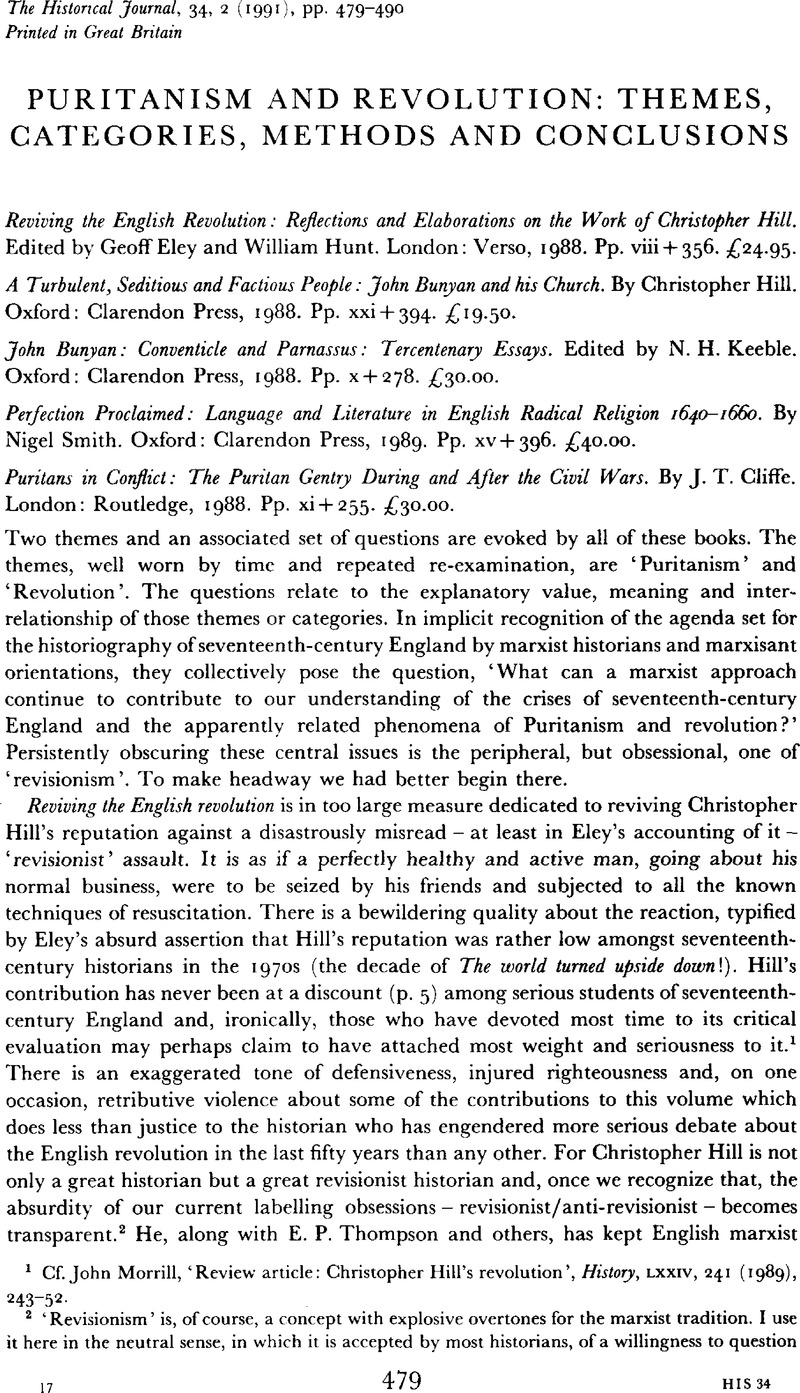No CrossRef data available.
Article contents
Puritanism and Revolution: Themes, Categories, Methods and Conclusions
Published online by Cambridge University Press: 11 February 2009
Abstract

- Type
- Review Articles
- Information
- Copyright
- Copyright © Cambridge University Press 1991
References
1 Cf. Morrill, John, ‘Review article: Christopher Hill's revolution’, History, LXXIV, 241 (1989), 243–52CrossRefGoogle Scholar.
2 ‘Revisionism’ is, of course, a concept with explosive overtones for the marxist tradition. I use it here in the neutral sense, in which it is accepted by most historians, of a willingness to question and, where necessary, discard received accounts. For some salutary remarks on revisionism/anti-revisionism in Stuart historiography see Glen Burgess, ‘On revisionism: an analysis of early Stuart historiography in the 1970s and 1980s’, Historical Journal (forthcoming).
3 Eley, and Hunt, (eds.), Reviving, pp. 337–9Google Scholar. Cf. the points made by Barry Reay, ibid. pp. 61–6.
4 Possibly like the Ranters?
5 Hill, , Turbulent, seditious and factious people, p. 322Google Scholar. Cf. pp. 40, 107, 150–I, 332, 368–9, 373.
6 White, B. R., ‘The fellowship of believers: Bunyan and Puritanism’, in Keeble, (ed.), Bunyan, P. 3Google Scholar.
7 Hill, Christopher, The world turned upside down: radical ideas during the English revolution (Harraondsworth, 1975)Google Scholar, ch. 8.
8 The heavenly footman in The miscellaneous works of John Bunyan, ed. Sharrock, Roger (Oxford, 1976–), V, 158–61Google Scholar.
9 Rivers, , ‘Grace, holiness and the pursuit of happiness: Bunyan and restoration latitudin-arianism’, in Keeble, (ed.), Bunyan, p. 68Google Scholar. The quotation is from The strait gate (1676).
10 It also seems to me that the assertion that Bunyan is in some sense transferring traditional or oral culture to the printed page will not bear the close scrutiny that the former is coming under in the work-in-progress of scholars like David Rollison. Cf. Sharrock, Roger, ‘“When at the first I took my Pen in hand”. Bunyan and the book’, in Keeble, (ed.), Bunyan, pp. 73, 75, 76Google Scholar.
11 Keeble, (ed.), Bunyan, pp. I, III, 171Google Scholar. Kaufmann's reading of Calvin (and Bunyan) on providence should be set against van der Mollen, Ronald J., ‘Providence as mystery, providence as revelation: Puritan and Anglican modifications of John Calvin's Doctrine of Providence’, Church History, XLVII, I (1978), 27–47CrossRefGoogle Scholar.
12 Hill, , Turbulent, seditious and factious people, p. 337Google Scholar. Hill, is quoting from A confession of my faith (1672)Google Scholar.
13 White, , ‘Bunyan and Puritanism’, in Keeble, (ed.), Bunyan, p. 8Google Scholar. White, is quoting Tibbutt, H. G. (ed.), The minutes of the first independent church (now Bunyan Meeting) at Bedford, 1656–1766, Publications of the Bedfordshire Historical Record Society, XV (Bedford, 1976), 17, 19Google Scholar.
14 Cf. Hill's remarks on Bunyan's attitude to Paul Hobson's ecumenicity. Hill, , Turbulent, seditious and factious people, p. 55Google Scholar.
15 Cf. J. C. Davis, ‘Cromwell's religion’, in John Morrill (ed.), Oliver Cromwell (forthcoming). It is instructive to note Christopher Hill's comments on the Bedford congregation's apparent pragmatism about its own designation well into the eighteenth century. Hill, , Turbulent, seditious and factious people, pp. 293–4Google Scholar.
16 Cf. Davis, J. C., ‘Radical lives’, Political Science, XXVII 2 (1985), 166–72CrossRefGoogle Scholar.
17 Smith, , Perfection proclaimed, p. 7Google Scholar, n. 17. For a recent review of ‘distinctions’ between presbyterians and Independents on the issue of religious toleration see Zakai, Avilu, ‘Religious toleration and its enemies: the Independent divines and the issue of toleration during the English Civil War’, Albion, XXI, I (1989), 1–33CrossRefGoogle Scholar.
18 See Condren, Conal, in ‘Radicals, Conservatives and Moderates in early modern political thought: a case of Sandwich Islands syndrome’, History of Political Thought, X, 3 (1989), 525–42Google Scholar.
19 Holstun, James, A rational millennium: Puritan utopias of seventeenth century England and America (New York, 1987)Google Scholar.
20 See Smith, , Perfection proclaimed, ch. I, esp. pp. 61–72Google Scholar, and for self-denial and the reconstruction of self, p. 66.
21 Ibid. pp. 36, 47, 49, 54, 151, 156, 193, 269.
23 Ibid. pp. 11, 347–8. Compare the claim that women ‘made a significant impact upon society from within the radical religious field’ (p. 12) with Phyllis Mack's caution about allowing that any radicals – other than Quakers – even temporarily broke free of patriarchalism.
24 Cliffe, J. T., The Puritan gentry: the great Puritan families of early Stuart England (London, 1984)Google Scholar.
25 Of course, the proportions of the parliamentary gentry who were Puritans are much higher: 65 per cent in 1643, 73 per cent in 1645.
26 Cf. Lake, P. G., ‘The impact of early modern protestantism’, Journal of British Studies, XXVIII, 3 (1989), 293–304CrossRefGoogle Scholar. See also, Spufford, M., ‘Puritanism and social control’, in Fletcher, Anthony and Stevenson, John (eds.), Order and disorder in early modern England (Cambridge, 1985), 41–57CrossRefGoogle Scholar.
27 C. H. George celebrating Christopher Hill's Society and Puritanism in pre-revolutionary England as ‘the most detailed social history of the whole body of English Puritans before the Revolution’ describes Hill's intention in that work as ‘to discover all the “non-theological” reasons for being a Puritan or for supporting Puritans’ (George, C. H., ‘Christopher Hill: a profile’, in Eley, and Hunt, , Reviving, p. 21)Google Scholar. This seems to me as constructive in the end as searching only for the nonsocio-economic reasons for being a bourgeois, or only for the non-socio-political reasons for being a Marxist.


